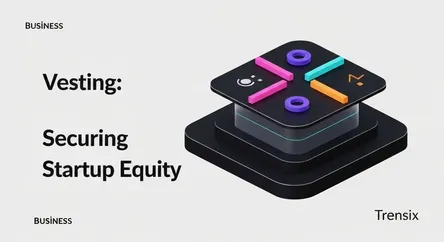Business
Vesting: Securing Startup Equity

Discover what vesting is and why it's a crucial mechanism for startups to retain talent and align founder interests for long-term growth.
What is it?
Vesting is the process of earning an asset, such as stock options or restricted stock, over a set period. In the startup world, it means that founders, employees, and advisors don't receive their full equity grant upfront. Instead, they earn it over time. A typical vesting schedule is four years with a one-year "cliff." This means the individual must stay with the company for at least one year to receive their first portion (usually 25%) of equity. After the one-year cliff, the remaining equity usually vests on a monthly or quarterly basis for the following three years.
Why is it trending?
Vesting has become a standard and essential practice in the startup ecosystem. Its importance is consistently highlighted due to the competitive market for talent and the need for long-term commitment. It serves as a powerful incentive for key employees and founders to stay with the company, contributing to its growth and success. For investors, vesting schedules provide a layer of security, ensuring that the core team is committed to the venture and protecting the company from a key member leaving early with a significant amount of equity.
How does it affect people?
For employees and founders, vesting directly links their personal financial outcomes to their long-term commitment to the company. It means they must contribute over a sustained period to realize the full value of their equity stake. If someone leaves before their shares are fully vested, they forfeit the unvested portion. This protects the company and its remaining stakeholders by ensuring that equity is held by those who are actively building the company's value, preventing so-called "dead equity" on the capitalization table.